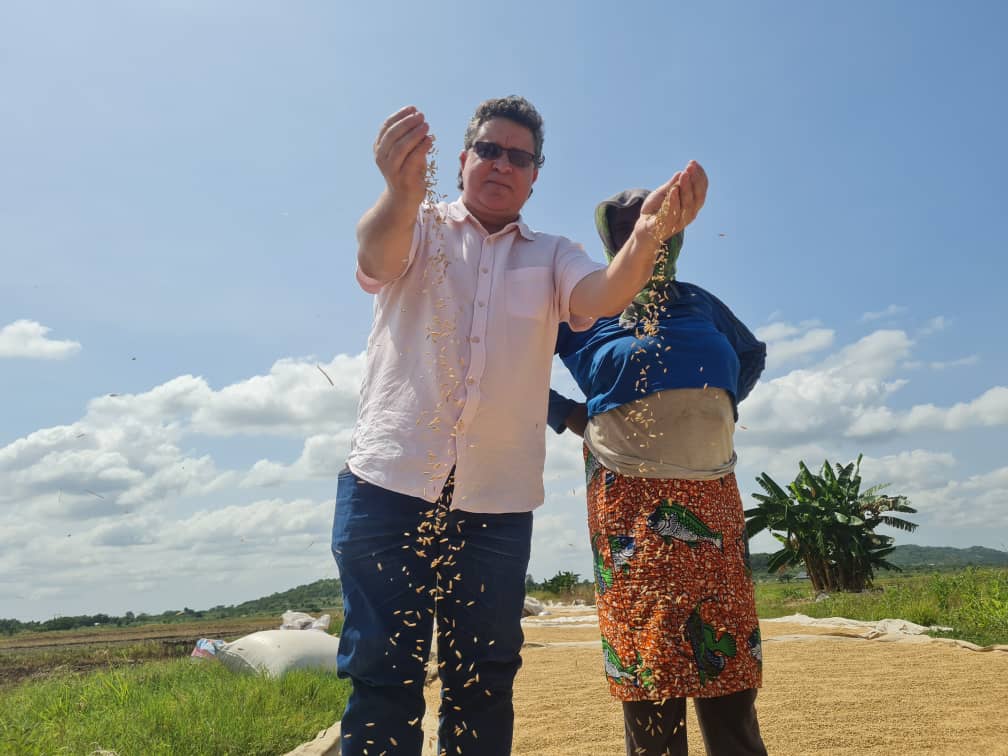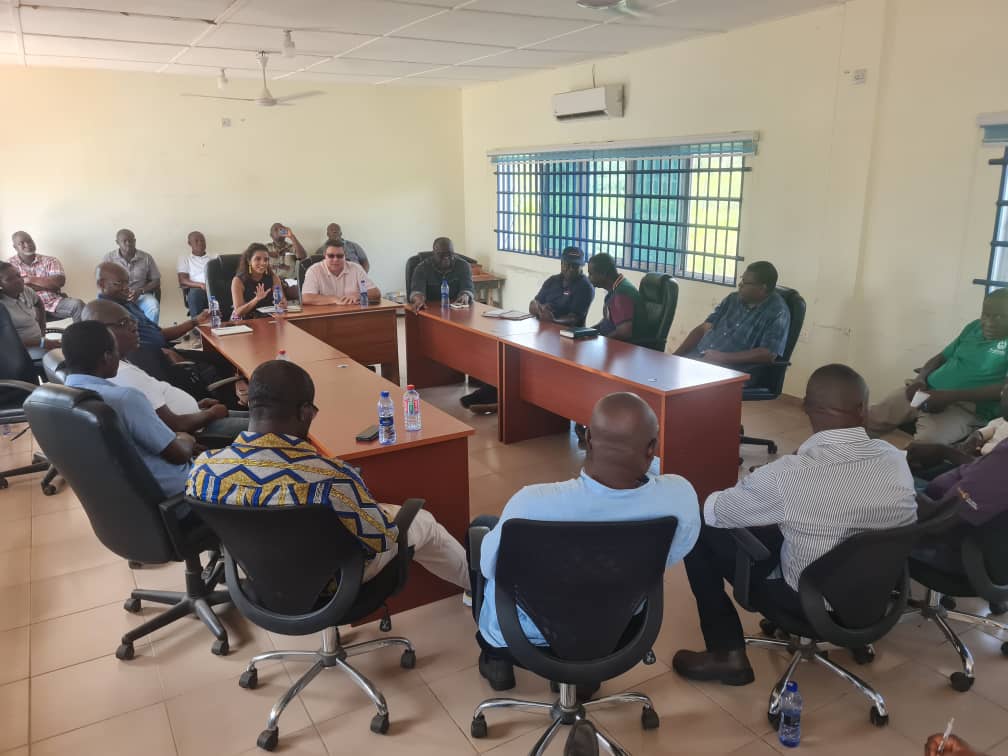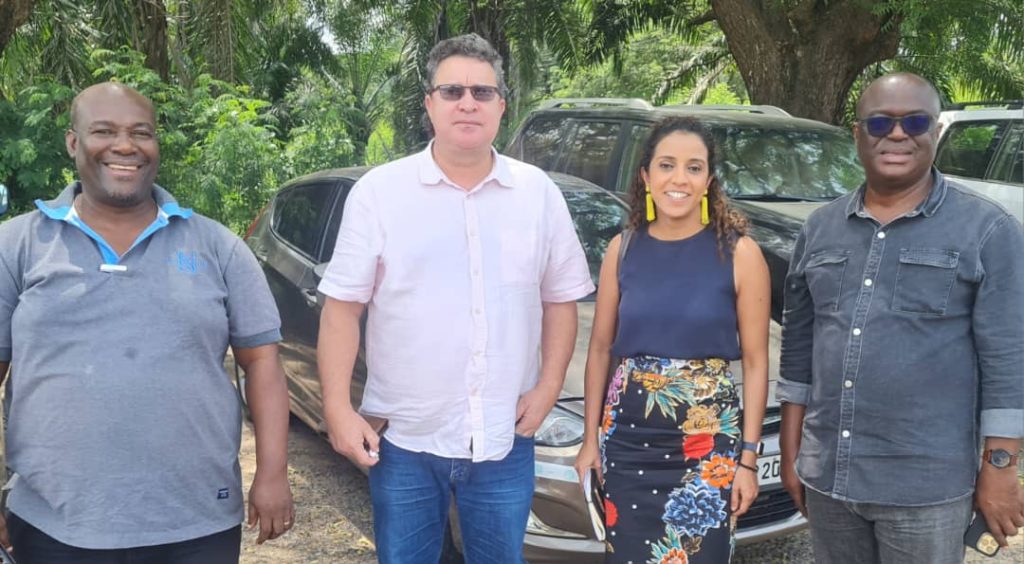Accra, Oct. 25, GNA – The Country Director of the World Bank, Mr. Pierre Laporte, has paid a working visit to some communities in the Eastern, Greater Accra and Volta Regions earmarked to benefit from the West Africa Food System Resilience Programme (FSRP).
In his company were: Ms. Ashwini Rekha Sebastian, the World Bank Task Team Leader for FSRP-Ghana, Mr. Osei Owusu Agyeman the FSRP Project Coordinator, along with technical experts of the project.
The reconnaissance visits were to afford Mr. Laporte a first-hand opportunity to witness final preparations made for the take-off of the project and to interact with its projected beneficiaries.
FSRP is planned for farmers and value chain actors within the Lower Volta Basin, the White/Red Volta Basin and the Middle Belt as well as Northern Ghana.
The trip sent him to the right and left banks of the Kpong dam, the Kpong Irrigation Scheme at Asutsuare in Greater Accra and Akuse in the Eastern Region, as well as the Kpong Left Bank Irrigation Scheme (KLBIS) at Torgorme in the North Tongu District of the Northern Region, where Mr. Laporte interacted with engineers, farmers and agricultural value chain actors.

Project engineers took him around farming sites where pervious works have been done under the Ghana Commercial Agriculture Project (GCAP) and earmarked for completion under FSRP.
He also visited some farms and engaged key players on the nature of the food production value chain in the area, who shared concerns, including their reliance on sunshine to dry harvested rice, the destructive effect of heavy trucks on their feeder roads; and low income from sales of their produce.
Incentives for the Private Sector
The World Bank Task Team Leader, said the project would take into account, the installation of rice mills with dryers in the area and would reach out to private sector players to facilitate the drying, storage, and warehousing stages of the value chain.
The FSRP Project Coordinator, Mr. Owusu Agyeman, assured them that FSRP would be of immense advantage to those, who would want to take agri business to the next level.
He added that proactiveness was one key objective of West Africa Food System Resilience Programme (FSRP) to ensure that conflicts, changes in climate, and other unpredictable factors did not disrupt the fortunes and nutritional sustenance of farmers, families and communities.
He advised farmers and key players in the agric sector to get their details captured in the FSRP and PFJ 2.0 database, for timely information about opportunities available to farmers and how to access or benefit from them.

Timely Interventions
At the Kpong Left Bank Irrigation Scheme, Mr. Laporte held a brainstorming session with commercial farmers operating at the scheme.
They cited capital, security, post-harvest infrastructure and technical backstopping as some of their major concerns.
The commercial farmers at the Kpong left bank constitute the first group ever in Ghana to invest in irrigation agriculture – cultivating maize, rice, vegetables and bananas.
The World Bank Country Director assured them saying, “our mission from headquarters (of the World Bank), is to disburse funds as quickly as possible, for timely interventions.
“But we need to first submit tangible justifications and to ensure that due diligence has been painstakingly exhausted”.
He, therefore, advised them to give their full cooperation and support to the FSRP Team for the speedy delivery of critical interventions.
Matching Grants Up To $200,000
Ms. Sebastian said FSRP was going to be offering matching grants to interested applicants to help them acquire equipment, including harvesters, and tractors.
Applicants would pay 20-25 per cent of the cost of the equipment and FSRP would take up the remaining 80-75 per cent of the entire cost.
Beneficiaries may get up to about two hundred thousand dollars ($200,000) in support, if they meet all requirements.
Strategic Agric Practice
The FSRP Project Coordinator, said an up-to-date database of farmers, stakeholders, their location, produce, size of land, and anticipated yields would give them production and marketing leverage.
He, therefore, prompted them to be strategic and systematic in all aspects of agricultural practice by ensuring that all conditions, including land preparation, best selection of seeds, timely arrival of inputs, reliable weather predictions, and ready markets were put in place before the commencement of production.
That, he said, was what FSRP would facilitate stage by stage and hand-in-hand with them.
He assured them that FSRP would apply all efforts aimed at minimising risks and costs, adding that, FSRP in Ghana was anchored on three themes of sustainability, ownership and public-private engagement.
The West African Food System Resilience Programme (FSRP) is a World Bank programme in collaboration with the Economic Community of West African States (ECOWAS) and the Government of Ghana.
It is to strengthen food system risk management, improve the sustainability of the agricultural productive base in targeted areas, and to harmonise agricultural markets in the West African sub region.
It is to roll out a combination of adaptive, innovative and technological interventions in agricultural practice that will equip vulnerable households, families, communities, farmers and food systems in West Africa, to enable them withstand uncertainty and the risk of shocks in food production and distribution.
Phase One of the programme covers Burkina Faso, Mali, Niger, and Togo, whiles Phase Two covers Chad, Ghana, and Sierra Leone.

The programme, which is being implemented through the Ministry of Food and Agriculture, involves three other regional institutions – the Economic Commission of West African States (ECOWAS), the Permanent Interstate Committee for Drought Control in the Sahel (CILSS), and the West and Central African Council for Agricultural Research and Development (CORAF).
GNA